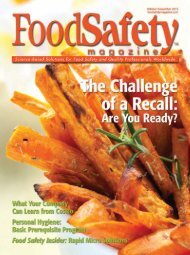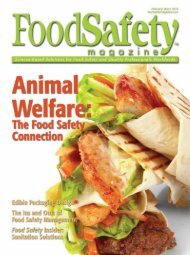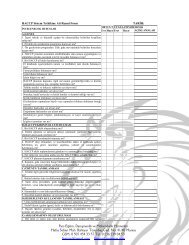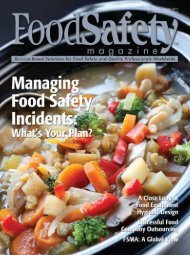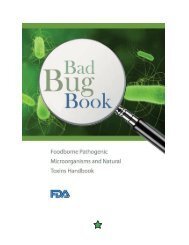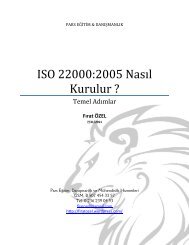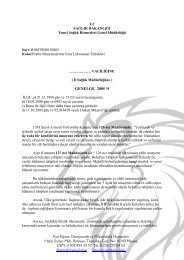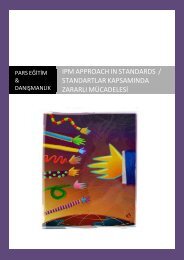Food Safety Magazine, February/March 2012
Food Safety Magazine, February/March 2012
Food Safety Magazine, February/March 2012
You also want an ePaper? Increase the reach of your titles
YUMPU automatically turns print PDFs into web optimized ePapers that Google loves.
turkey products may have been contaminated with a multidrug-resistant strain ofSalmonella Heidelberg and followed a July 29 FSIS Public Health Alert initiated dueto concerns about illnesses caused by Salmonella Heidelberg.• The April 2011 recall “Minnesota Firm Recalls Turkey Burger Products Due to PossibleSalmonella Contamination.” Implicated in this recall was Salmonella serotypeHadar. Although not noted in the FSIS recall, CDC in its outbreak reportingnoted, “The outbreak strain of Salmonella Hadar is resistant to many commonlyprescribed antibiotics, which can increase the risk of hospitalization or possibletreatment failure in infected individuals.” Salmonella Hadar was resistant to at leastampicillin, amoxicillin/clavulanate, cephalothin and tetracycline. This recallsparked much consumer concern becauseof the labeling “All Natural.” Thevast majority of the consuming publicdoesn’t recognize that the definition of“natural” would exempt antibiotics. 19Therefore going against most consumers’logic, the routine use of antibioticsis a “natural” way to raise foodanimals.The time to address the problem of antibiotic-resistantfoodborne infections islong overdue. How many more cases areneeded before the federal government imposesstricter regulations?The U.S. government can take immediatesteps to help further protect the publichealth. Draft Guidance for Industry 209should be finalized and issued by FDA toprotect against the inappropriate use of antibioticsas growth promoters or for feedefficiency in food animals; not doing so ina timely manner gives the impression toconsumers that the Obama administrationis not interested in addressing this public health emergency.“Antibiotic resistanceimpacts public healthwhen people consumefood contaminated withantimicrobial-resistantbacteria resulting fromthe exposure of foodanimals toantimicrobials...”How many more hospitalizations from antibiotic-resistant foodborne infectionsdoes it take before large numbers of industry leaders proactively work to protect theirbrands and the consumers who trust in the safety of their purchase?Brand Protection and Practices: A Way ForwardConsumers are showing more interest in the source of their food and, in the caseof food animals, how they are raised. The food industry is now, more than ever, recognizingthat “food safety” means more than just microbiological control—it also incorporatesconsumer perceptions of what is considered safe.Rather than enduring lawsuits and the pitiless media, meat and poultry industryleaders can proactively adopt practices and publicly declare their intentions to reduceuse of medically important antibiotics. Industry leaders who take responsibility andpride in their products should declare their policies and make consumers aware of thepractices they employ. Corporations should publish on their websites and in printedmaterials their policies on antibiotic usage, state support for judicious use and highlightthat antibiotics are not being used for growth promotion. Knowing that the mostimportant antibiotics should be preserved for human medicine, industry leaders maywant to voluntarily restrict use of classes of antibiotics—tetracycline, penicillin,macrolide, lincosamide, streptogramin, aminoglycoside and sulfonamide—except forthe treatment of sick or diseased animals.The outlined principles come from legislation introduced by Congress’s only microbiologist,Representative Louise Slaughter of New York. The Preservation of Antibioticsfor Medical Treatment Act(PAMTA) has historically received bipartisansupport, yet has not been able togain enough traction to make its waythrough a divided Congress.A novel idea would be for industryleaders, many of whom read this publicationand who are concerned about theinjudicious use of antibiotics, to adoptthe principles of PAMTA well in advanceof any forthcoming government regulations.This enlightened self-interest mayimprove their market base, public perceptionand ultimately their product. nSusan Vaughn Grooters, M.P.H., serves as directorof research and education at STOP <strong>Food</strong>borneIllness (formerly S.T.O.P. Safe Tables Our Priority)and is an executive committee member for thecoalition Keep Antibiotics Working (KAW). Sheholds a B.S. in food sciences and nutrition from theUniversity of Vermont and an M.P.H. in epidemiologyfrom the University of Massachusetts–Amherst. An inducted member of Delta Omega,the National Honorary Society for Public Health,Grooters was also recently appointed by USDASecretary Tom Vilsack as the consumer representativefor the National Advisory Committee on MicrobiologicalCriteria for <strong>Food</strong>s.References1. “Antibiotic” is the commonly used term to describeantibacterial drugs and will be used assuch in this article. However, the author wouldlike to acknowledge the more strict definition of“antibiotic” as being a compound that is naturallyproduced or derived from a fungus orother microorganism that has the ability to inhibitbacterial reproduction that causes illnessesin humans and animals. However, some antibacterialdrugs may be synthetically producedand derived compounds (e.g., not “naturally”occurring, or produced by a fungus, etc.) andtherefore would not meet the strict definition ofthe term “antibiotic.”2. www.cdc.gov/getsmart.3. Levy S.B., G.B. FitzGerald and A.B. Macone.1976. Changes in intestinal flora of farm personnelafter introduction of a tetracycline-supplementedfeed on a farm. N Engl J Med 295(11):583–588.4. Notice of Opportunity for a Hearing (NOOH)that the agency published in the Federal Registeron Tuesday, August 30, 1977, for penicillinand a companion NOOH revoking approval fortetracycline (published in the Federal Register44 F O O D S A F E T Y M A G A Z I N E



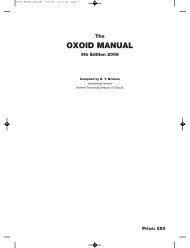
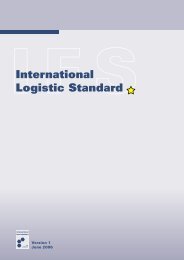
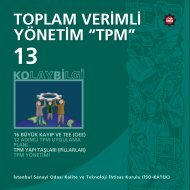
![Otomatik indirilmez ise tıklayınız [Download]](https://img.yumpu.com/44170525/1/190x190/otomatik-indirilmez-ise-taklayanaz-download.jpg?quality=85)
